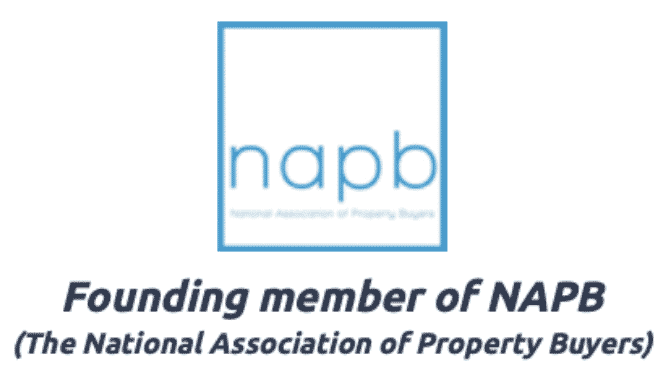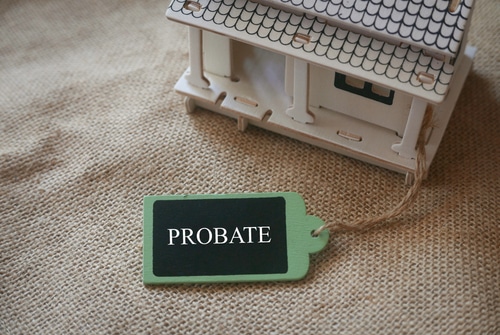Sell Probate Property
Sell your inherited home quickly
- FREE cash offer within minutes
- Receive funds in 7 days
- A guaranteed sale on any property

A simple solution for selling probate property
Probate is a legal process where the courts review a deceased person’s will (if there is one).
It ensures that the deceased’s assets are distributed correctly. And that their debts, taxes, and expenses are paid off.
A grant of probate gives certain rights for handling the deceased’s assets.
As most people’s largest asset, property is a big part of probate.
However, inheriting a property doesn’t necessarily mean you can sell it immediately.
You can sell the property after probate is granted.
The laws for probate and inherited property vary throughout the UK. England & Wales have separate laws from Scotland.
We cover both legal jurisdictions and take special care to highlight when the law differs between them.





Free cash offer within minutes, any condition, any location.
What is probate?
Probate is essentially permission to distribute a deceased person’s assets.
When the estate is beyond a certain size, it must be sent through probate. Courts analyse the will and listen to beneficiaries to determine everything is above board.
In England & Wales, property going through probate cannot be sold until it has been granted probate.
(There is one exception to this rule: When a joint owner on a property simply needs to supply the death certificate for the deceased.)
In Scotland, this process is called ‘Confirmation’ and it’s broadly the same.
Are you named in the will as the new owner?
Many people assume that property ownership automatically transfers according a will.
It doesn’t.
The deceased’s assets must go through probate. It ensures that the property ownership transfer is correct.
Until probate is complete, people can contest the will. If they are successful, property ownership may not transfer to you.
Free cash offer within minutes, any condition, any location.
What you need to know about the probate process
-
Do I need to apply for probate?
-
How to apply for probate
-
What if probate is contested?
-
How long does probate take in the UK?
In England & Wales, probate applications depend on whether or not there is a will:
- If there is a will, the listed executor must be the one to apply for probate
- If there is no will, a close family member can apply for probate.
If there is already a joint owner listed on the inherited property, ownership passes to them. It must still go through probate, but the joint owner can manage it.
In Scotland, the process is similar. There are slightly different considerations about other assets, but the estate must go through confirmation if property is involved.
Who can apply for probate will vary, but it can be the executor of the will, next of kin, insurance companies, or anybody with a stake in the will.
Do I need to apply for probate?
In England & Wales, probate applications depend on whether or not there is a will:
- If there is a will, the listed executor must be the one to apply for probate
- If there is no will, a close family member can apply for probate.
If there is already a joint owner listed on the inherited property, ownership passes to them. It must still go through probate, but the joint owner can manage it.
In Scotland, the process is similar. There are slightly different considerations about other assets, but the estate must go through confirmation if property is involved.
Who can apply for probate will vary, but it can be the executor of the will, next of kin, insurance companies, or anybody with a stake in the will.
How to apply for probate
The easiest way to apply for probate is to contact a solicitor. This is especially true if property is involved.
However, you apply yourself. Just remember that there are many legal technicalities to deal with.
In England & Wales, you can apply for probate through the Probate Service website. However, before you do, you must begin paying inheritance tax to HMRC, plus value the estate.
The Probate Service will guide you through the process.
You’ll need details of the death certificate, Will (if there is one), and details of the estate. It is a long-winded process but much cheaper than dealing with a solicitor.
In Scotland, you will need to talk to your local Sheriff’s Court, which will guide you through the application for confirmation process.
What if probate is contested?
Anybody who believes they have a greater right to the property than those named in the will (or the deceased’s next of kin) can contest the probate.
A judge will analyse the evidence and decide who has the legal right to the property.
If probate is contested and your right to inherited property is challenged, you should hire a solicitor.
How long does probate take in the UK?
In England & Wales, the process can take 16 weeks to complete but can take several years in more challenging cases.
However, several years will often be reserved for the vast estates where there may be multiple cases of probate property.
In Scotland, confirmation is a bit faster. It can take just a few weeks (depending on how overloaded the court system is). However, it can also take several years for major estates.
Either way, the process is not quick.
Free cash offer within minutes, any condition, any location.

How much does probate cost in the UK?
In England & Wales, the application fee for probate is £273 (as of 2024).
In Scotland, the application fee for confirmation is £200 (as of 2024).
If you are using a solicitor, the fees may vary. Most charge based on the value of the estate – somewhere between 1% and 4%.
The larger the estate, the larger this amount will be.
Free cash offer within minutes, any condition, any location.
Taxes on inherited properties
When you inherit a probate property, taxes may be due – some immediately, others when you sell.
What is inheritance tax for property?
Inheritance tax is a tax paid when you receive assets from a deceased person.
However, they are not always due.
They are only paid when the assets are valued at over £325,000.
You must contact HMRC to pay any inheritance tax due.
What is the inheritance tax rate for property?
The tax rate is 40% of anything over £325,000.
No inheritance tax is due on inherited property valued below £325,000.
Remember that this is the total value of all assets received from the deceased.
So, if you inherit a property worth £125,000 and shares worth £300,000, inheritance tax would be due despite both values being below the £325,000 threshold.
Start the cash house buying process today with our team of property experts.
The three types of inherited property taxes
There are three types of tax on inherited property across the UK. Not all of them will be paid when the property completes probate.
This is the only tax due on the inheritance of the property.
40% of the property value over £325,000 must be paid to HMRC.
Inheritance tax
This is the only tax due on the inheritance of the property.
40% of the property value over £325,000 must be paid to HMRC.
Stamp Duty Land Tax (SDLT)
Stamp duty is a tax most property buyers pay.
It will either be 3% or 4% of the property’s selling price, depending on the country you are in (Scotland has the highest rate).
Stamp duty is complex. You do not pay it on your first home but you must pay it on all subsequent homes.
This means that if the inherited property is your first home, subsequent homes you buy will have stamp duty.
However, no stamp duty must be paid when you inherit the house.
In Scotland, rules are slightly different.
You may need to pay stamp duty if you do not sell an inherited property within three years of confirmation. This will be at the current stamp duty rate.
Capital Gains Tax (CGT)
Capital Gains Tax is also complex.
In all regions of the UK, capital gains tax is a tax you pay on the profit from the sale of a home.
However, it only applies if the house is not classed as your main home.
If you have inherited a property, you must tell HMRC where your main home is.
Otherwise, they will determine your primary property when you carry out any property sales when you sell property.
You can think of capital gains tax as a tax on your profits.
The amount of tax you pay will depend on the difference in property value from when you inherited it to when you sold it. So, if the property price has increased by 20%, you would pay tax on that 20%.
HMRC will inform you precisely how much capital gains tax is due when you sell your property.
Sell your inherited property fast, for cash.
Avoiding inheritance tax on property
You cannot avoid inheritance tax on property.
HMRC will know if you’ve inherited property, and they’ll know exactly how much tax must be charged.
The only times inheritance tax is avoided is if the property is passed to the deceased’s spouse. (This assumes the deceased did not gift out the property before they passed away.)
You can only avoid capital gains tax by avoiding selling your property.
Free cash offer within minutes, any condition, any location.
Selling probate property
Once you have received probate on a property, selling it is almost the same as selling any other property.
In theory, you can start the sale process before probate is granted on the inherited property.
But it may not be worthwhile because you can’t predict probate timeframes.
Can you sell your inherited property?
In general, if you have not been granted probate, you cannot legally sell the house.
The court must first decide whether you legally own the property.
However, there is an exception to this rule. If you were listed as a joint owner on the property beforethe deceased passed away, you can list it for sale before probate has been granted.
However, you may have financial obligations to some of the beneficiaries of the will. You must talk to a solicitor to find out about these.
Is selling the right choice for inherited property?
For some, keeping inherited property is important. Many inherit a property they grew up in.
New owners may live there or rent it out (you’ll must pay tax on rental income).
However, if you want to make money on the property, selling it the most straightforward choice.
Once you’ve been granted probate, the process is relatively simple – depending on market conditions.
Free cash offer within minutes, any condition, any location.
How it works
Gain peace of mind when selling your probate property with We Buy Any Home.
Once you have been granted probate on the property, you are the legal owner. You can sell it on the open market, which can take several months. But selling to a cash buyer like We Buy Any Home is faster, simpler, and guaranteed.
-
Fill in the online form
Fill in your details online through our free, no-obligation valuation form (below).
Alternatively, you can call us on 0800 774 0004
-
Receive offer
Once we’ve received the details of your property, we will make you an initial offer within 24 hours.
Finally, we will call you to discuss our offer and your ideal time frame for moving.
-
Sale agreed
If you agree to our initial offer, we’ll send two RICS-qualified surveyors to your property.
This enables us to give you our final offer.
If you agree to our final offer, we can appoint you a solicitor from our trusted panel. (You can find your own, if you would prefer).
Finally, you can sit back, relax, and let us take care of all the work.
Free cash offer within minutes, any condition, any location.
How long does selling inherited property take?
If the property has yet to go through probate, the process could take anywhere from 16 weeks to several years.
Once it probate is complete, the selling process is the same as selling any other property – 25 weeks on average.
Popular Areas We Buy Probate Property For Cash
We operate across the United Kingdom including England, Scotland, and Wales. We can buy your house fast, whether you’re in the Scottish highlands or the Cornish beaches.
Sell your probate property fast
We know how tricky it can be to sell property quickly, particularly inherited property.
If you wish to sell your property fast, we here at We Buy Any Home can offer a free cash offer. Reach out today.
If you accept our cash offer, you can unlock the funds from your inherited home in as little as 7 days.
Frequently asked questions when selling a house in probate
Want to discuss a little further? Freephone 0800 774 0004 or call our office 0203 789 2401
What are the steps of selling a house with probate?
If you are selling a house in probate, there are several steps to follow and factors to be aware of:
- Register the death. During probate application, you must provide a death certificate and an original copy of the will.
- Get a property valuation. You need to know the value of the property to apply for a Grant of Probate. It is useful to gather valuations from two or three estate agents. You can use the average valuation.
- Check the property’s titles and deeds. This is needed for selling any property. It ensures that you are aware of any property restrictions. If you cannot find these digitally through the Land Registry, you should find them in paper title deed with the deceased person’s solicitor.
- Pay Inheritance Tax. Before probate can be granted, the inheritance tax from the deceased person’s estate must be paid. This can be costly. A Direct Payment Scheme may allow you to use funds from the estate to pay the tax. Alternatively, an Executor’s loan can help to alleviate any financial stress during this period.
- Apply for Grant of Probate. Finally, complete your application for Probate. This will usually incur a fee. The property can be listed on the market and sold. Alternatively, you can also sell the property to cash house buyers like We Buy Any Home.
How long does probate take?
Selling a house through probate can typically take longer than a usual house sale. Probate can usually take between six and 12 weeks from applying to receiving the Grant of Probate. However, during this time, the property can still be put on sale. However, if an offer is made, you must wait until the Grant of Probate before the sale can be completed.
That being said, properties in probate that are vacant can be encouraging for home buyers who are seeking a purchase without a chain as there is little chance for disruption in the buying process. You can also receive an offer on the property within minutes from WeBuyAnyHome.com. Receive your free cash offer now.
Does probate stop you from selling a house?
Probate doesn’t prevent you from listing a property for sale. However, Grant of Probate is required to complete the sale. Receiving probate can usually take between six and 12 weeks from your application being submitted.
Can the executor sell a house that is in probate?
The executor of an estate can sell a house that is in probate, provided that this authority is explicitly outlined in the deceased’s will or granted by the court. However, the executor needs to conduct due diligence to ensure there are no surviving joint owners with legal rights to the property.
Additionally, the executor must carefully examine the will for any clauses that might impose restrictions on selling the property. By confirming these factors, the executor can proceed with confidence in carrying out their responsibilities to sell the house during the probate process.
Do you pay capital gains tax on inherited property?
You will only pay capital gains tax when you sell the inherited property when it isn’t your main home i.e. it is a second home. You do not pay capital gains tax just for owning an inherited property.
What are the rules for probate in the UK?
Probate rules are complicated. Generally speaking, all real estate must go through probate. It is up to the judges to determine who will benefit from the sale of that property. This is made easier if there is a will, or if probate is not contested.
Does every death have to go through probate UK?
No. Deaths only need to go through probate if there is a sizeable inheritable estate. The definition of sizeable varies between the countries in the UK.
How long does probate take for property UK?
Depending on the size of the estate, it could be anywhere from several weeks to several years.
How much does an estate have to be worth to go to probate UK?
In most cases, if the estate is worth more than £5,000, it must go through probate.
What is a probate property UK?
Probate is the legal process a deceased person’s estate must go through before any right to manage the estate is granted i.e. grant sales of property, inheritance, etc. A probate property is a property going through this process. This property cannot be sold until probate is granted.
How do I find probate property in the UK?
Various real estate agents may maintain probate property listings.
Can you live in a house during probate UK?
Yes. This is assuming that the deceased has not forbidden you from living there. The executor of the estate can control who lives in the property during probate, although they must also consider the wishes of the inheritors. This means they, rarely, can let a random person live there.
How do I avoid capital gains tax on inherited property UK?
If the inherited property is classed as your main home, you do not have to pay capital gains tax on the sale.
Should you renovate an inherited property before selling?
Renovating properties takes a lot of time and effort, and often with only minimal financial gain.
While you can renovate the property, if a lot of work needs carrying out, most inherited properties are best sold ‘as is’.
What do you do when you inherit a house UK?
Before you have control of the inherited house, you must go through the probate process. Talk to a solicitor about this. Once you have been granted probate, you can do whatever you want with the home.
Do you pay Inheritance Tax on inherited property UK?
If the property is valued at over £325,000, you must pay inheritance tax. As of 2024, the tax will be 40% of anything over the £325,000 threshold. All inherited property will be factored into the equation.
Free cash offer within minutes, any condition, any location.
Don’t just take our word for it.
View more reviews "Faultless"
I found the whole process faultless. Right from my initial enquiry the communication I received was excellent, all the way through to the completion of the sale of my property. I would be happy to recommend We Buy Any Home.
"Wouldn’t hesitate to recommend them"
We approached We Buy Any Homes after our house sale fell through at the last minute. We were keen to progress with our onward purchase and the team at We Buy Any Home provided that opportunity. It was a smooth, easy, straightforward process and we were guided throughout the process. We wouldn’t hesitate to recommend them.





Here you will find the latest UK property
news, as well as industry tips and advice.



Get a free cash offer today
Enter your details below
"*" indicates required fields








